Much more than a Dreamer
By Barrington M. Salmon -Contributing Writer- | Last updated: Mar 29, 2018 - 1:59:04 PMWhat's your opinion on this article?
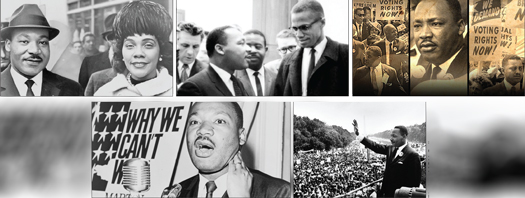
Photos: MGN Online
|
Remembering a ‘radical, peace-loving warrior,’and staying in the fi ght for justice and equality
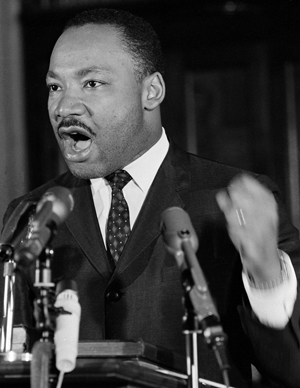
The Rev. Martin Luther King Jr. addresses a Selma, Ala., rally on Feb. 22, 1965, telling the crowd that Blacks won't abide by Gov. George Wallace's ban against night demonstrations. Photo:
AP Photos
|
Since his assassination on the evening of April 4, 1968, the Rev. Dr. Martin Luther King, Jr.’s name and legacy has grown in mythic proportions. Yet a lot of the truth he represents is now shrouded in fable.
Every year on his birthday, Jan. 15, Americans pause to honor a man lauded among other things, as a symbol of peace, a social justice warrior and the instrument of racial reconciliation during a critical moment in America’s troubled racial history. But there is much more.
An assassin ended Dr. King’s life at 6:05 p.m. while he and his associates stood on the balcony of the Lorraine Motel in Memphis, Tenn. He was in town to take part in and to add his support to Memphis sanitation workers who had gone on strike for more wages and better working conditions.
Americans geared up to observe the 50th anniversary of the assassination, ostensibly committed by lone gunman James Earl Ray but widely considered to have been orchestrated by elements in the U.S. government.
Dr. King’s presence in Memphis was yet another indication of a pivot towards the end of his life from issues related purely to civil rights and more focused on economic concerns, America’s militarism and hegemony, and the plight of the poor.
This King, Jamila Bey said, is the one that too few people in this country are aware of, as the media, politicians and other entities continue to offer the public a palatable, sanitized, revisionist version of the Civil Rights icon.
“Martin Luther the King, I think was a radical, peace-loving warrior whose name and legacy has been neutered,” said Ms. Bey, a D.C.-based writer, journalist and commentator. “He has been rendered into a veritable eunuch who wanted to march and hold hands. He’s been neutered because he recognized that economic injustices perpetrated against Blacks would blunt and kill any hard-earned gains they made. They keep talking about the Dream, but he was into human, civil rights and economic rights. It’s his own words. He said we have gone to the Bank of Justice and the funds have been marked insufficient.
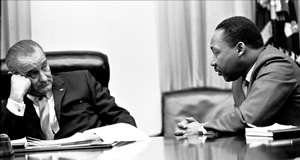
President Lyndon B. Johnson meets with Martin Luther King, Jr. in the White House Cabinet Room, March 18, 1966. Photos: MGN Online
|
“He was not someone who wanted to Kumbaya. He encouraged people to follow the process but said ‘you have denied us our due.’ He explained why justice can’t wait. He was tired and at the end of his rope.”
The Rev. Derrick Harkins agreed with Ms. Bey.
“It’s great to be looking at the accuracy (of who Dr. King is) because some have appropriated him,” said Rev. Harkins, senior vice-president for Innovation in Public Programs at Union Theological Seminary in New York. “The real King is very different. A central part of King’s legacy was that he saw it as important to call America to account. People forget that he spoke of America writing a check to African Americans marked ‘insufficient funds.’ ”
“At great cost to himself, he called President Lyndon Johnson to account for the Vietnam War,” continued Rev. Harkins, who previously served as director of Faith Outreach for the Democratic Party and advisor to President Barack Obama. “He was pushing against systems and structures trying to hold them to account. The real hard work that King was about was calling them out for injustice. We have to remember this. Then it doesn’t become so easy for people to raise up King. He gave his life because he was indeed talking against the grain.”
Rashad Robinson, executive director of Color Of Change, said it’s imperative that people are told the truth about Dr. King’s actions and legacy.
“They tell us a story about what’s not true which hinders our efforts to achieve a full understanding of who Dr. King is and what he represented,” said Mr. Robinson, during a telephone call from Portugal where he was attending a drug policy conference. “I think the most essential thing about Dr. King was his strategic mind and using people power to build narrative change ... he wasn’t just about speeches and people feeling good. ...”
Mr. Robinson heads the nation’s largest online racial justice organization. Its mission is to help people respond effectively to injustice in the world around them. With more than one million members, Color Of Change activists pressure, coax and cajole decision-makers in corporations and government to create a more human and less hostile world for Black people in America.
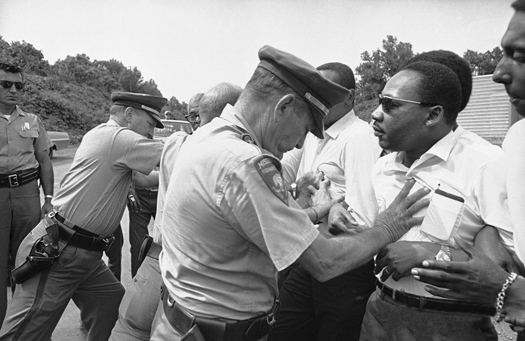
Mississippi Highway Patrolmen shove the Rev. Martin Luther King and members of his marching group off the traffic lane of Highway 51 south of Hernando, Miss., June 7, 1966. The Rev. King, Student Non-Violent Coordinating Committee leader Stokely Carmichael (head visible at upper right) and other civil rights leaders had taken up the march begun by James Meredith. Photos: MGN Online
|
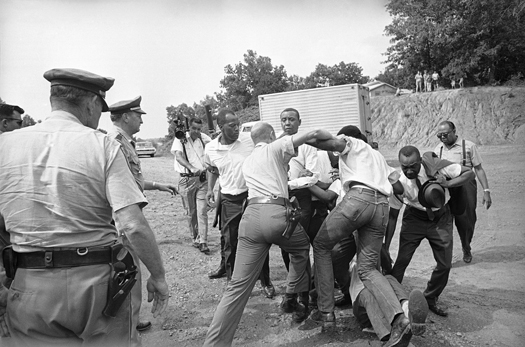
Hatless Mississippi highway patrolmen grapple with Black marchers accompanying the Rev. Martin Luther King on a march along U.S. 51 south of Hernando, June 7, 1966. Photos: MGN Online
|
“If you see how unpopular Dr. King was during the height of the movement, see how he was vilified and now how he’s dignified, it does a disservice to us in our understanding of what he did,” he said.
“It’s clear that popularity isn’t a good measure of one’s effectiveness. In fact, if someone is very popular, then there are likely questions about how effective they really are.”
Renown civil rights activist Dorie Ladner said that Dr. King embodied the philosophy of a “beloved community,” which said everyone should have compassion for justice and be forthright in their community, “learn to live with each other on a different level; and forgiving people outside of our community who were hostile and murderous.”
Ms. Ladner, a Mississippi native, said Dr. King crystallized for her, the desire to be intimately involved in changing the world around her.
“Mississippi Delta people were living under semi-slavery,” said Ms. Ladner, who became an activist in her late teens. “I didn’t want to live like my grandparents did. [Fellow activist Lawrence] Guyot and the rest said no. We started out to make changes in this country. A lot of people made it, a lot of them didn’t.”
Dr. King’s analysis that the fight for justice, fairness and equality was not separate from the economic oppression imposed by those in power Blacks and Whites is what Ms. Bey believes put a target on his back.
“He was an astute political theoretician; he was smart, strategic and committed and those who knew were terrified,” she said. “His showing up for poor Whites and Blacks and the threat of his ability to put money in the pockets of Black people is what got him killed. He had to die, yes indeed. People don’t recognize this because we don’t speak about class.”
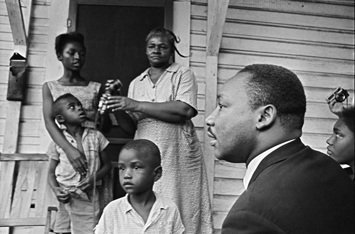
Dr. Martin Luther King Jr., right, chats with Greenwood African Americans on their front porch during his door-to-door campaign, telling all African Americans to register to vote and support his Miss. Freedom Democratic Party. King arrived on July 21, 1964 in Greenwood for the beginning of a 5-day tour of Mississippi towns. Photo:
AP Photos
|
Like Dr. King, the new organizers of the New Poor People’s March are railing against oligarchs, the politicians they control and a system that exploits the poor, the underserved and the vulnerable.
Rev. Barber says that instead of commemorating and celebrating the legacy of Martin Luther King Jr. in the 50th anniversary of his assassination, the goal is to pick up the fight that was left unfinished. The campaign, titled the Poor People’s National Campaign: A Call to a Moral Revival, was launched in December 2017 in Washington. D.C.
With the Reverend Liz Theoharis of the Kairos Network, Rev. Barber has crisscrossed the country working to unite a diverse community of working class and poor people who have been marginalized and pushed out of society’s mainstream.
After months of promoting the campaign, holding assemblies and training for community organizations, social movements, and individuals from unions the faith movement and elsewhere, the campaign culminates this summer.
Black Lives Matter co-founder Patrisse Khan-Cullors spoke on National Public Radio about Dr. King’s legacy and its impact on the current social justice movement that is being powered by young people.
“Part of our work in this generation has been about reclaiming MLK, and the ways that this government, in a lot of ways, has totally whitewashed his legacy,” she said in a Jan. 2016 interview with Rev. Barber. “As a young kid growing up, what we were given was the ‘[I Have A] Dream’ speech. We weren’t given his grassroots organizing, we weren’t given that King was a local organizer. We weren’t given everything he did up until the Voting Rights Act. And when I joined this movement as a young person, I realized, oh, King is so much more.”
Rev. Barber said Dr. King’s legacy transcends the civil rights movement.
“I see the legacy connected to the Old Testament prophets who stood up for the marginalized and against injustice, to the social gospel movement that stood up and asked a question, ‘What would Jesus do’ in the face of terrible economic inequities and damage to workers?’ ” he said. “Right on through to the second Reconstruction, which I call the civil rights movement. You know, that intersectionality—fusion politics: bringing together Blacks and Whites and Latinos, and Jews and Christians and Muslims. But doing it in a way that takes race and class seriously and does not separate them.”
Rev. Harkins, Ms. Ladner and Ms. Bey agreed that those in the Black Lives Matter movement, those confronting the National Rifle Association and others are heirs of Dr. King’s radical activism.
“Dr. King’s life and work is sync with ‘Never Again,’ Black Lives Matter and athletes taking a knee,” Rev. Harkins said. “His legacy is in line with kids in Florida and Chicago fighting against gun violence.”
“He would be in a tent with the Occupy Movement and standing with Black Lives Matter,” Ms. Bey added. “He was a threat realized during the Montgomery Bus Boycott. He exemplified the theory of economic collectivism and through the bus boycott showed how to bring these companies to their knees. Why he’s not studied in Economics is a travesty.”
All of the interviewees said the future of the civil and human rights struggle lies with young people.
“We can’t do justice to Martin Luther King by forgetting that he called out people, clergy and politicians. Dr. King said we can’t wait. They want to make him safe. If you relegate him to the steps of Lincoln Memorial, then ‘I Have a Dream’ means you don’t have to confront that dream as a present reality.”
“Dr. King ruffled feathers. When he said he was a drum major, he’d be making a lot of noise, unsettling people, discomforting them. He was committed to upsetting the status quo,” Rev. Harkins concluded.
INSIDE STORIES AND REVIEWS
-
-
About Harriett ... and the Negro Hollywood Road Show
By Rabiah Muhammad, Guest Columnist » Full Story -
Skepticism greets Jay-Z, NFL talk of inspiring change
By Bryan 18X Crawford and Richard B. Muhammad The Final Call Newspaper @TheFinalCall » Full Story -
The painful problem of Black girls and suicide
By Charlene Muhammad -National Correspondent- » Full Story -
Exploitation of Innocence - Report: Perceptions, policies hurting Black girls
By Charlene Muhammad -National Correspondent- » Full Story -
Big Ballin: Big ideas fuel a father’s Big Baller Brand and brash business sense
By Bryan Crawford -Contributing Writer- » Full Story






 Click Here Stay Connected!
Click Here Stay Connected!








